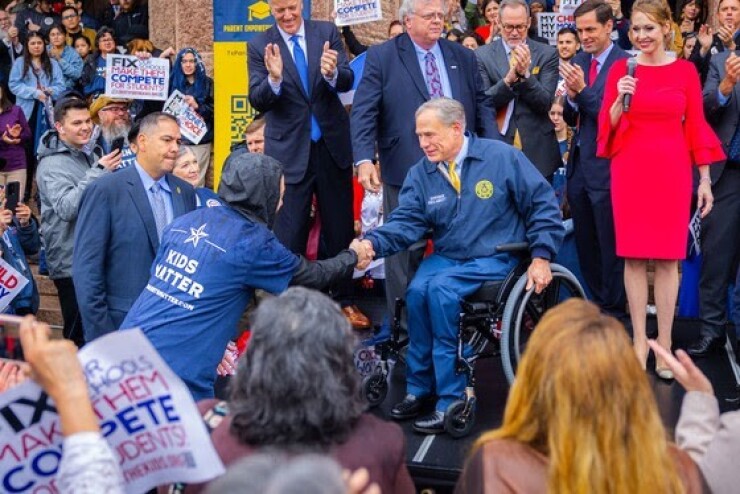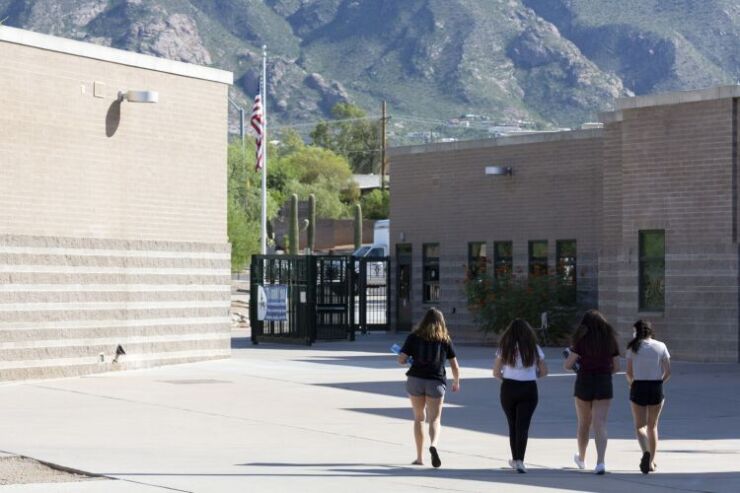A year after the launch of Arizona's universal school voucher program, the state is still trying to get a handle on its cost and accountability.
This comes as several states enacted laws this year to help fund students at private schools or who are homeschooled, with Texas teed up to consider the move in a special legislative session starting Monday.
Nonprofit advocacy group

"State policymakers have moved forward boldly this year, united in their pursuit of educational freedom to ensure every child has access to an individualized, high-quality education," EdChoice President and CEO Robert Enlow said in a statement. "Thanks to the progress made in 2023 — the Year of Universal Choice — nearly 20 million students now have access to a learning environment of their family's choosing."
Critics contend vouchers or tax credits given to parents or guardians of private school students reduce overall state revenue and harm public school funding.
"All states rely on some metric of student counts to calculate K-12 per-pupil funding, so when vouchers reduce state revenues and the number of children attending public schools, those schools lose funding (either directly through a per-student funding formula or other state and federal funding tied to the per-pupil equation),"
An EdChoice report
Arizona is feeling the pinch in its budget.
The state in 2022 enacted what then-Gov. Doug Ducey called the most expansive school choice law in the nation, allowing state money to flow to parents to help pay for private school tuition, online curriculum, and educational supplies. But, the empowerment scholarship accounts, or ESAs, which became available Sept. 24, 2022, have proven to be
Initial estimates released in June 2022 by the state's Joint Legislative Budget Committee cited what it called a "highly speculative" projection universal expansion would cost $33.4 million in fiscal 2023, rising to $125.4 million in fiscal 2025. The program's actual price tag was $474 million in fiscal 2023, which ended June 30, according to Democratic Gov. Katie Hobbs' office.
Updated estimates her office
Those projections
As of Oct. 2, the program was funding 67,935 students. The latest quarterly report on the ESA program, released Sept. 1, showed
State lawmakers began a deep dive into the program with a Sept. 20 hearing by a House Ad Hoc Study Committee on Empowerment Scholarship Accounts Governance and Oversight.

"As with any new or growing program there are legitimate concerns from both proponents and opponents about the operation of the ESA program," said Republican House Speaker Ben Toma, who chairs the committee and who sponsored 2022's universal ESA bill.
Alan Maguire, an economist and public policy consultant, told the committee while there is a lot of good data, some is unavailable from private schools or has limitations.
"Part of the exercise, from a budget perspective would be to try to figure out if we can identify who went from where to where and if we could identify what the net cost or benefit of that move is, we could get a better handle on the budget," he said. "But we've got to get that first piece of data pretty well locked down."
Maguire projected ESA demand will slow going into next year as parents are unlikely to change their child's school halfway through the school year and that private institutions may not have the capacity to take on higher enrollment.
He added that even with waiting lists it may be hard for private schools to finance expansion projects given high interest rates and construction costs and philanthropic fatigue.
Public school advocacy group Save Our Schools Arizona called the dearth of data "shocking."
"Our state leaders must face reality and rein in the out-of-control ESA voucher program before it bankrupts the state and siphons $1 billion from our already underfunded local public schools," Beth Lewis, the group's executive director, said in a statement.
In Texas, pro- and anti-school voucher factions are readying for a special session that Republican Gov. Greg Abbott
Joined by religious leaders, Abbott last month declared Oct. 15 as School Choice Sunday.
"Collectively, we can make Texas even better when we all go to work to make sure we get across the finish line this urgent need to provide parents the ability to choose the school that's best for their child," he said in a statement.
To pressure lawmakers, Abbott
Animosity between the Republican-controlled legislative chambers that erupted over the failed ouster of Texas Attorney General Ken Paxton, who the House impeached and the Senate acquitted this summer, could hurt the chances of a bill's passage. In past years, House Democrats and rural Republicans successfully blocked voucher bills.
Austin-based Liberty for the Kids launched a campaign asking people to call their state lawmakers to urge them to support universal school choice in the special session.
"Our public school system needs to refocus its spending on what matters — kids and teachers," Mandy Drogin, campaign director for Next Generation Texas at the Texas Public Policy Foundation, said in an emailed missive to parents last month. "The way to make this happen is by empowering parents with Education Savings Accounts."
A
An American Federation of Teachers Texas





